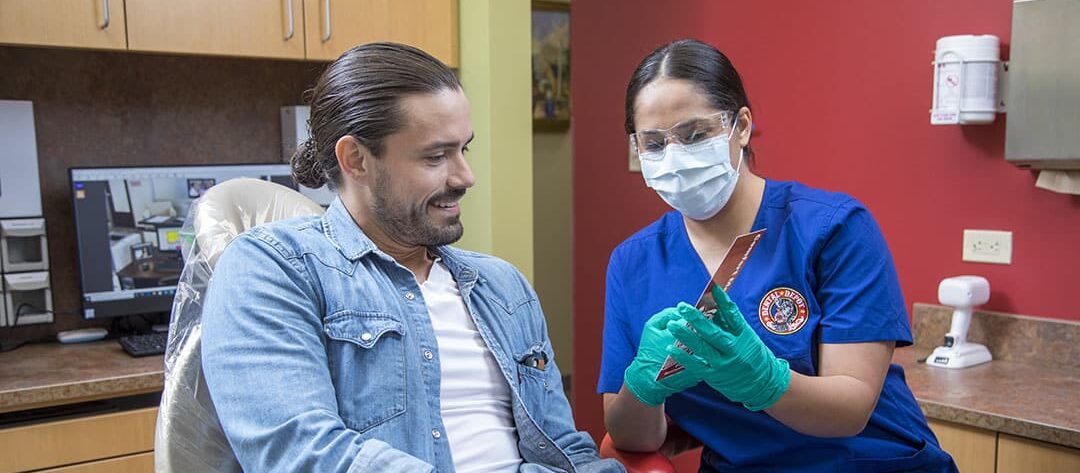At Dental Depot of DFW, we understand that the thought of wisdom teeth removal can be intimidating for many patients. Our goal is to provide a comfortable, stress-free experience that caters to your unique needs. We have a comprehensive team of dental professionals that are dedicated to ensuring you receive the highest quality care possible.
Our skilled dentists and dental hygienists are the backbone of our team, providing exceptional dental care and guiding you through the entire process of wisdom teeth removal. They work in collaboration with our prosthodontists, who specialize in the restoration and replacement of teeth, and orthodontists, who focus on the alignment and positioning of teeth. Together, they ensure that your teeth remain healthy and functional after the extraction.

Wisdom teeth are a third—and last—set of molars that typically erupt between the ages of 16 and 22, and they come in at the very back of the mouth. Technically, these four teeth complete the set of 32 every adult has, but they are frequently extracted soon after they begin to develop. The arrival of wisdom teeth is generally characterized by an unpleasant taste in your mouth; swelling, bleeding, or tender gums; swelling or pain in the jaw, or difficulty opening your mouth. While some people never experience a problem with their wisdom teeth in oral health or function, wisdom teeth can cause swelling, pain, discomfort, and crowding for many people, and require extraction.
Molars—like wisdom teeth—are necessary for chewing, and all humans are born with three sets. The first set erupts around age 6, the second around age 12, and the third before the age of 21 or 22. Anthropologists believe that, as methods of eating and cooking evolved, so did the development of our skull. As the diet changed into food that was easier to chew, humans began to rely less on the third set of molars, the wisdom teeth. While wisdom teeth may not always erupt, they are still present under the gums and can still cause problems. Wisdom teeth that do not erupt through the gums are referred to as impacted.
Because wisdom teeth appear so late, there is often not enough room in the mouth for them and they may not erupt properly or completely. Partially erupted wisdom teeth can result in a bacterial infection, while teeth that don’t erupt at all can develop into a cyst that damages bone and gum tissue. Other potential problems include crooked eruption, bone loss around the roots, damage to adjacent teeth, and insufficient room to brush or floss around the tooth.
There is not much you can do to prevent eruption or impaction of your wisdom teeth. However, regular checkups, exams, and x-rays with your dentist can help monitor the progression of their development so you can get ahead of any potential problems. If your dentist determines that your wisdom teeth need to come out, the method of extraction will depend on how far the tooth has erupted, if it has yet at all.
If the wisdom teeth have fully erupted from the gum line, they can be removed with a simple extraction by your dentist. You will receive a local anesthetic and numbing agent in your gums before the tooth is loosened and pulled.
A surgical wisdom teeth extraction will be required if your wisdom teeth are impacted, or still below the gum line. Some dentists can perform surgical extractions themselves while others may refer you to an oral surgeon. During a surgical extraction, the surgeon makes an incision in the gum to remove the tooth bone and root, cutting the tooth into pieces if necessary to keep the incision site as small as possible. You will be administered a mild sedative and local anesthetic during the procedure so, though you won’t feel any pain, you will be groggy and numb afterward.
Regardless of the procedure, there will be some bleeding, soreness, and swelling for a few days after your teeth have been pulled. The remaining hole in your gum will also be packed with gauze and will require special care. Your dentist will provide you with care instructions that minimize the risk of developing a dry socket, a painful condition that results from an incision site that doesn’t heal properly and exposes the nerves and bones of your jaw. If stitches were required, your dentist or surgeon will let you know if they will need to be removed after a few days or if they will dissolve on their own.
Dental Depot DFW is proud to deliver exceptional dental care for every member of your family at every stage of life. Our comprehensive team of professionals includes dentists, orthodontists, oral surgeons, and periodontal specialists, which means you’ll receive the same quality and continuity of care for all of your dental needs at one convenient location. Whether you need a simple teeth cleaning and checkup or wisdom teeth extraction, Dental Depot DFW is here to ensure your oral health for life. We make caring for your family’s dental needs easy, with flexible scheduling, Saturday appointments, and multiple locations. To find the location nearest you or to schedule an appointment, click here.

Dr. Kana is dedicated in providing the highest level of care. He and the staff are committed to education and expanding knowledge. He has completed over 1,000 hours of continuing education. Dr. Kana hopes that being accessible to all of his patients, strong community feel and values, and strong patient/customer service is what will help our practice and community grow.
